
Goofy is a cartoon character created by the Walt Disney Company. He is a tall, anthropomorphic dog who typically wears a turtle neck and vest, with pants, shoes, white gloves, and a tall hat originally designed as a rumpled fedora. Goofy is a close friend of Mickey Mouse and Donald Duck, and is Max Goof's father. He is normally characterized as hopelessly clumsy and dim-witted, yet this interpretation is not always definitive; occasionally, Goofy is shown as intuitive and clever, albeit in his own unique, eccentric way.

Mickey Mouse Works is an American animated television series produced by Walt Disney Television Animation featuring Mickey Mouse and his friends in a series of animated shorts. The first Disney television animated series to be produced in widescreen high definition, it is formatted as a variety show, with skits starring Mickey Mouse, Minnie Mouse, Donald Duck, Daisy Duck, Goofy, Pluto and Ludwig Von Drake while Horace Horsecollar, Clarabelle Cow, Morty and Ferdie Fieldmouse, Huey, Dewey and Louie, Chip 'n' Dale, Scrooge McDuck, Pete, Humphrey the Bear, J. Audubon Woodlore, Dinah the Dachshund, Butch the Bulldog, Mortimer Mouse, José Carioca, and Clara Cluck appear as supporting or minor characters. Musical themes for each character were composed by Stephen James Taylor with a live 12-piece band and extensive use of the fretless guitar to which the music of the series was nominated for an Annie Award in both 1999 and 2001. Most of the shorts from the series were later used in House of Mouse.
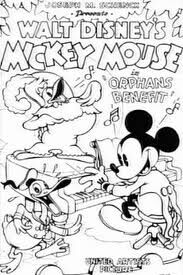
Orphan's Benefit is an American animated short film produced by Walt Disney Productions in black-and-white. It was first released in 1934 and was later remade in Technicolor in 1941 under the corrected title Orphans' Benefit. The cartoon features Mickey Mouse and his friends putting on a vaudeville-style benefit show for a group of unruly orphans. It contains a number of firsts for Disney, including the first time in which Mickey Mouse and Donald Duck appear together, and was the 68th Mickey Mouse short film to be released, and the sixth of that year. It was also the cartoon which had the first story to be written that featured Donald Duck, though it was the second Donald Duck short to be produced and released, after The Wise Little Hen.
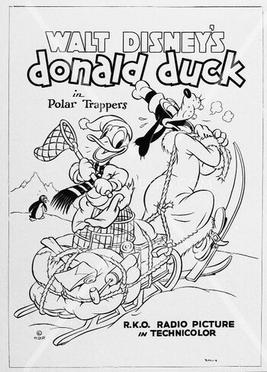
Polar Trappers is a 1938 Donald Duck and Goofy cartoon set in the South Pole, where the duo are trapping polar animals. This is the first cartoon where Donald Duck and Goofy appear without Mickey Mouse.
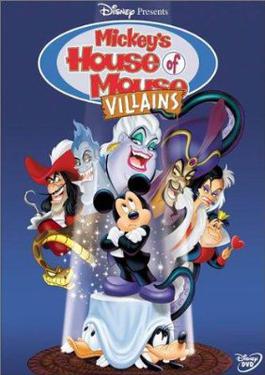
Mickey's House of Villains is a 2002 American direct-to-video animated comedy-horror film produced by Walt Disney Television Animation. It is based on the animated television series House of Mouse, and serves as a stand-alone sequel to the direct-to-video animated film Mickey's Magical Christmas: Snowed in at the House of Mouse, starring Mickey Mouse, Donald Duck, Minnie Mouse, Goofy, Daisy Duck, and Disney Villains that appeared in past Disney productions. It was released on both VHS and DVD by Walt Disney Home Entertainment on September 3, 2002.

How to Swim is a cartoon made by Walt Disney Productions in 1942, featuring Goofy.

Donald's Golf Game is a Donald Duck cartoon released by the Walt Disney Company in 1938. Donald falters on the fairway while his caddies Huey, Dewey, and Louie all try to "tee" him off, with a grasshopper and a bag of trick clubs.

Moose Hunters is a 1937 American animated short film produced by Walt Disney Productions and released by United Artists. It was the 93rd short in the Mickey Mouse film series, and the fourth for that year. The cartoon stars Mickey Mouse, Donald Duck, and Goofy on a moose hunting expedition. It was directed by Ben Sharpsteen and features music by Paul J. Smith. The voice cast includes Walt Disney as Mickey, Clarence Nash as Donald, and Pinto Colvig as Goofy.
On Ice is a 1935 theatrical cartoon short in the Mickey Mouse film series, produced by Walt Disney Animation Studios. It was the 79th Mickey Mouse short film to be released, and the eighth of that year.

Clock Cleaners is a 1937 American animated short film produced by Walt Disney Productions and released by RKO Radio Pictures. The cartoon follows Mickey Mouse, Donald Duck, and Goofy working as janitors in a tall clock tower. The film was directed by Ben Sharpsteen and features original music by Paul Smith and Oliver Wallace. The voice cast includes Walt Disney as Mickey, Clarence Nash as Donald, and Pinto Colvig as Goofy. It was the 97th short in the Mickey Mouse film series to be released, and the eighth for that year.
The second wave of Walt Disney Treasures was released December 3, 2002. This was the final wave with the tin's individual number embossed on the tin.
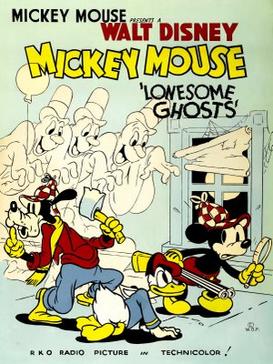
Lonesome Ghosts is a 1937 Disney animated cartoon, released through RKO Radio Pictures on Christmas Eve, three days after Snow White and the Seven Dwarfs (1937). It was directed by Burt Gillett and animated by Izzy (Isadore) Klein, Ed Love, Milt Kahl, Marvin Woodward, Bob Wickersham, Clyde Geronimi, Dick Huemer, Dick Williams, Art Babbitt, and Rex Cox. The short features Mickey Mouse, Donald Duck & Goofy as members of The Ajax Ghost Exterminators. It was the 98th short in the Mickey Mouse film series to be released, and the ninth for that year.

Mickey and the Seal is a cartoon short created by Walt Disney in 1948. It was nominated for Academy Award for Best Animated Short Film, but lost to MGM's Tom and Jerry cartoon The Little Orphan, which shared one of seven Oscars for the Tom and Jerry series. It was the 122nd short in the Mickey Mouse film series to be released, and the second produced that year.
Walt Disney's Funny Factory is a series of DVDs by Walt Disney Home Entertainment. Very similar to the line, each release would feature around one-hour of Disney animated short films, grouped by a starring character, or set of characters. As opposed to the chronological nature of the Walt Disney Treasures line, each release would feature various cartoons in no particular order. The series featured two waves of releases, on January 17, 2006, and November 21, 2006. Another similar line was Walt Disney’s Classic Cartoon Favorites.

Magician Mickey is a 1937 Walt Disney Mickey Mouse cartoon, originally released to theaters on February 6, 1937. This was the 92nd Mickey Mouse short to be released, and the third for that year.

Moving Day is a 1936 American animated short film produced by Walt Disney Productions and released by United Artists. The cartoon, set during the contemporary Great Depression, follows the antics of Mickey Mouse, Donald Duck, and Goofy as they frantically pack their belongings after being dispossessed from their home. The film was directed by Ben Sharpsteen and includes the voices of Walt Disney as Mickey, Clarence Nash as Donald, Pinto Colvig as Goofy, and Billy Bletcher as Sheriff Pete. It was the 85th Mickey Mouse short to be released, and the eighth of that year.
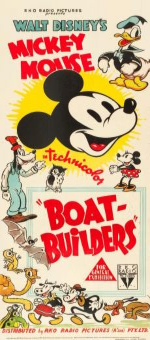
Boat Builders is an animated short film produced by Walt Disney, distributed by RKO Radio Pictures and released on February 25, 1938. The film was directed by Ben Sharpsteen and animated by Frenchy de Trémaudan, Louie Schmitt, Chuck Couch, Eddie Strickland, Clyde Geronimi, Paul Satterfield, Archie Robin, Don Patterson. It was the 99th short in the Mickey Mouse film series to be released, and the first for that year.

Hawaiian Holiday is a 1937 American animated short film produced by Walt Disney Productions and released by RKO Radio Pictures. The cartoon stars an ensemble cast of Mickey Mouse, Minnie Mouse, Pluto, Donald Duck, and Goofy while vacationing in Hawaii. The film was directed by Ben Sharpsteen, produced by John Sutherland and features the voices of Walt Disney as Mickey, Marcellite Garner as Minnie, Clarence Nash as Donald, and Pinto Colvig as Goofy and Pluto. It was Disney's first film to be released by RKO, ending a five-year distributing partnership with United Artists.

The Whalers is a cartoon produced by Walt Disney Productions, released by RKO Radio Pictures on August 19, 1938, and featuring Mickey Mouse, Donald Duck and Goofy.

Mickey's Service Station is a 1935 animated short film produced by Walt Disney Productions and released by United Artists. The film, which stars Mickey Mouse, Donald Duck, and Goofy as car mechanics, was also the final black-and-white appearance of Donald, Goofy, and Pete and the penultimate animated black-and-white film produced by Disney after Mickey's Kangaroo which was released later the same year. It was also the first team-up of the classic trio of Mickey, Donald, and Goofy. Mickey's Service Station was directed by Ben Sharpsteen, who at the time had directed only Silly Symphony shorts, and starred the voices of Walt Disney, Clarence Nash, Pinto Colvig, and Billy Bletcher. It was the 74th Mickey Mouse short film to be released, and the third of that year.

















